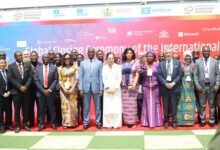Ghana Nuclear Power Programme to generate $1.2bn—Prof. Nyarko

The Director-General of the Ghana Atomic Energy Commission (GAEC), Prof. Benjamin Jabez Botwe Nyarko, has said that Ghana’s Nuclear Power Programme (NPP) is estimated to generate US$1.2 billion through local industry participation during its implementation.
Speaking at the 4th edition of the Ghana Industrial Summit and Exhibition in Accra, the Director-General said the US$1.2 billion was a projection based on a 1000MW nuclear power plant construction which was exclusive of the benefits that would be accrued when the nuclear power plant became operational.
Prof. Nyarko who is also the Vice-Chairman of the Ghana Nuclear Power Programme Organisation (GNPPO) and the Board Chair of the Nuclear Power Ghana (NPG), explained that industrial involvement was one of the 19 infrastructure issues of the International Atomic Energy Agency (IAEA) recommended milestone approach to develop a nuclear power programme.
He added that a newcomer country was expected to generate at least 20 per cent local content and local participation in the nuclear power project.
In leading participants to appreciate the financial benefits to the local industry, Prof. Nyarko explained that if one considers a US$6 billion nuclear power project, 20 per cent was very significant and would be a huge boost to the local industry.
“In the IAEA approach of a newcomer country undertaking nuclear power programme, there are 19 infrastructure issues, and one of the infrastructure issues is industrial involvement. And so, if we are talking about an industry that is going to cost about $6 billion, you can estimate how much benefits Ghanaian local industries will derive from the programme,” he said.
Prof. Nyarko cautioned, however, that the country’s ability to fully participate would depend on the capacity of the local industry. He, therefore, called for the deepening of the partnership between the Association of Ghana Industries (AGI) and the Ghana Nuclear Power Programme Organisation (GNPPO) to prevent the reliance on foreign companies for goods and services to the nuclear power project.
“Once Ghana is on the path of adding nuclear power to its energy generation mix, it is essential that the capacity of Ghanaian owned industries is built so that they do not lose out,” he added.
When it comes to nuclear, some standards and specifications must be met, and so, local industries must be well equipped to benefit from the implementation of the nuclear power project,” he said.
BY TIMES REPORTER







